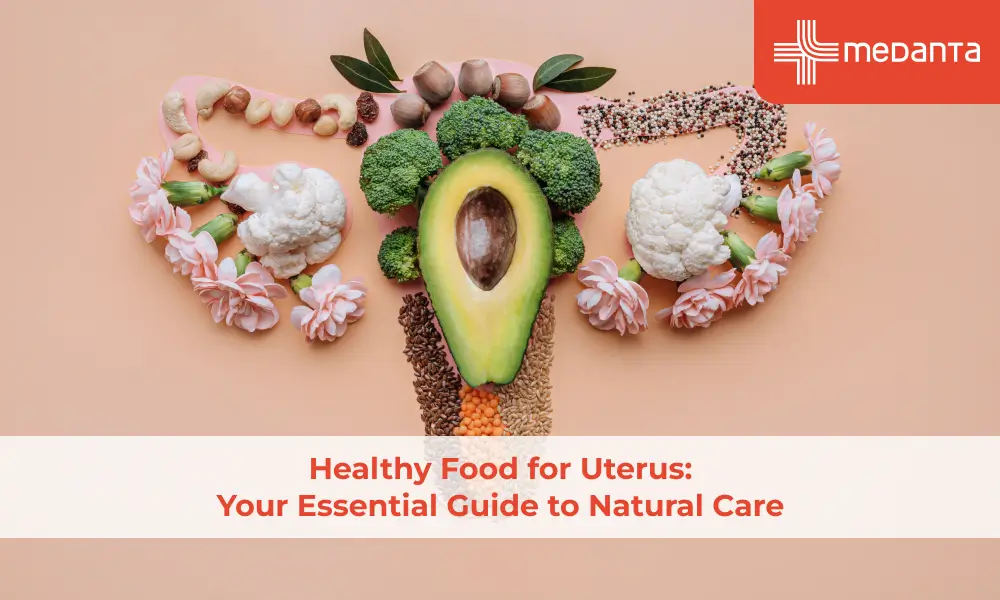Healthy Food for Uterus: Your Essential Guide to Natural Care

TABLE OF CONTENTS
Studies indicate that around 1 in 5 Indian women experience uterine issues like fibroids, endometriosis or irregular periods. Research reveals that what we eat has an impact on the functioning of this essential reproductive organ, leading many to look for healthier diet options.
A balanced diet helps maintain a healthy reproductive system. The right nutrients not only keep your hormone levels balanced but also support your tissue health. Proper nutrition remains vital throughout a woman's reproductive life, especially when you experience menopausal changes. The right food choices in daily meals can prevent issues like fibroids and endometriosis while promoting overall wellness.
Women's bodies undergo many physical changes during puberty, adulthood, pregnancy, and menopause. Their reproductive organs stay healthy and active with a well-planned nutritious diet. Green vegetables, berries, fish, nuts, seeds, whole grain cereals, yoghurts, citrus fruits, and lentils/beans support hormone balance. These foods improve blood circulation and boost immunity. This article explains the best food choices for uterine health and their benefits to reproductive wellness.
How Do Nutrients and Diet Affect Reproductive Health?
Good nutrition plays a vital role in maintaining women's reproductive health in balance. Studies say women who eat four servings of fruits or vegetables each day have a smaller chance of developing uterine myomas compared to women who eat one serving. The protective benefits are even stronger with citrus fruits.
Specific nutrients play key roles in reproductive function. For example, women with vitamin D deficiency have a higher chance of developing myomas. Animal-sourced vitamin A reduces uterine myoma risk more effectively than plant-based sources.
Your body needs essential fatty acids like omega-3s to balance reproductive hormones and reduce uterine inflammation. So, fatty fish such as salmon, mackerel and sardines help maintain healthy reproductive tissue.
The antioxidants found in berries and vibrant fruits shield reproductive tissues from oxidative stress. Researchers have found that strawberry extract helps increase the percentage of apoptotic cells in leiomyoma tissue.
Food choices significantly impact hormone regulation. Your body relies on fibre to get rid of extra oestrogen through waste. This process might help reduce the chance of developing fibroids. A Mediterranean diet enriched in vegetables, fruits, whole grains, legumes and olive oil associates with better fertility rates and lower endometriosis risk.
The foods you avoid matter just as much. Alcohol increases hormone levels that stimulate fibroid growth.
What Foods Support a Healthy Uterus?
Spinach, kale, and Swiss chard provide iron, calcium, and folate, which help improve blood flow in the uterus.
The antioxidants in berries (blueberries, strawberries, raspberries) protect reproductive tissues from oxidative stress.
Your body's immunity gets a boost from citrus fruits that support collagen production in uterine tissues.
Fatty fish like salmon, mackerel, and sardines contain omega-3 fatty acids that balance reproductive hormones and reduce uterine.

Which Foods Are Beneficial for Healthy Ovaries?
The monounsaturated fats in avocados regulate hormones and boost egg quality.
Essential fatty acids from nuts and seeds (almonds, walnuts, flaxseeds) support menstrual cycles.
Quinoa & other whole grains are rich in complex carbohydrates. These maintain a stable hormonal balance.
The probiotics in Greek yoghurt support gut health and positively affect reproductive function.
What Dietary Habits Promote Hormonal Balance for Women?
A high-fibre diet helps your body eliminate excess oestrogen through stool. Cruciferous vegetables improve your body's oestrogen metabolism. Reduced alcohol intake prevents hormonal disruption. The Mediterranean diet pattern links to better fertility rates and lower risk of reproductive disorders.
Your uterus needs proper food choices that enable you to control your reproductive health. The body responds well to the right nutrients - omega-3s reduce inflammation and antioxidants protect delicate tissues from damage.
Simple dietary changes can be powerful. A few extra servings of fruits & vegetables each day substantially lowers your risk of uterine problems. This method costs less than medical treatments and has no unwanted side effects.
Better reproductive wellness begins with your plate. Colourful foods deliver essential vitamins to keep hormones balanced through different life stages. Women who follow Mediterranean-style eating patterns face fewer reproductive issues and stay healthier overall.
The most encouraging part? Making steady, small food choices helps keep you safe in the long run. Your body puts in work every day so giving it proper nutrition shows you value all it does. Taking care of your uterus can boost your energy, reduce pain, and ease worries about your reproductive health down the road.
FAQs
Which leafy greens are best for uterine and ovarian health?
Spinach, kale, & Swiss chard are your best options. These greens have iron and folate that keep blood flowing well to your uterus. They are rich in vitamins A, C, E and K, which help your cells work better and balance your hormones. Adding these to your meals helps prevent anaemia that can hurt your reproductive health.
How do berries and citrus fruits benefit the uterus?
Berries (strawberries, blueberries, raspberries) protect your reproductive organs from damage with their strong antioxidants. They help reduce inflammation and repair tissue.
Citrus fruits boost your immunity and help your body absorb iron better. Their vitamin C makes uterine tissue's collagen stronger and gives extra protection.
What role do nuts, seeds, and fatty fish play in reproductive health?
Almonds, walnuts, flaxseeds, and chia seeds give you essential omega-3 fatty acids that reduce inflammation and balance hormones. Walnuts work better than fertility supplements to improve sperm health. Fatty fish like salmon & sardines have anti-inflammatory omega-3s that improve blood flow to reproductive organs.
Are there foods that can harm the uterus or ovaries?
These foods can hurt your reproductive health:
Processed foods with harmful additives and unhealthy fats
Too much sugar throws off insulin and hormone balance
Caffeine raises stress hormones and makes menstrual cramps worse
Alcohol affects how your body processes oestrogen
Trans fats cause more inflammation
How does fibre intake affect oestrogen and uterine health?
Fibre helps your body get rid of extra oestrogen through stool, which might lower your risk of fibroids. Research shows eating more fibre can reduce circulating oestrogen levels by 10-25%, which lowers your risk of endometriosis. Wheat bran specifically lowered serum estrone and estradiol levels, but oat and corn brans didn't have this effect.






